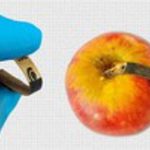Researchers from The University of Sao Paulo (USP) in Brazil have created an electrochemical device made from kraft paper that detects pesticide residues in fruits and vegetables in real-time when connected with the electronic gadget. For an apple or cabbage for instance the sensor can detect carbendazim which is a popular fungicide employed in Brazil although it has been restricted.
The latest device is extremely sensitive and is comparable to those glucometers that diabetics use for assessing blood sugar levels, however, the results of food scans for pesticides is shown on a smartphone. “In the tests we conducted the sensitivity of this device was comparable to those of the traditional techniques. Additionally, it’s quick and cheap,” said Jose Luiz Bott Neto Postdoctoral Fellow at IFSC USP.
The system is made up of a paper-based substrate that is altered with carbon ink, and subjected to electrochemical treatments with an acid-based medium in order in order to stimulate carboxyl groups which allow detection to be made, Bott Neto explained.
When they developed the device researchers analyzed the durability as well as the shape of the substrate.
Source: phys.org
